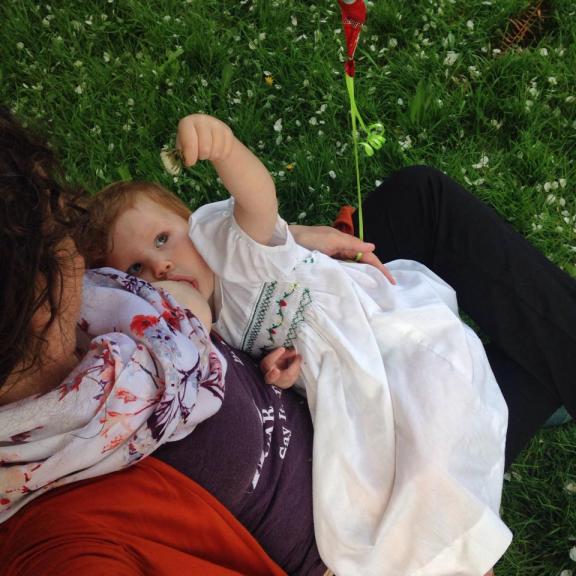by Jessica Martin-Weber
This isn’t a statement, it’s not even as significant as a photo op. It’s just a moment. An average, regular, normal moment for my daughter and me. In 2 years of breastfeeding, she and I have had thousands like it. Taking public transportation on our way for a day downtown with the family, she got tired, wanted a cuddle, and a little mama milk. And I snapped a few breastfeeding selfies because this regular, normal moment is important to me and a big part of my life. A life I share with my online community and when something is important pretending it doesn’t exist and never happens is lonely.
At first I distracted her and put her off. I didn’t want to breastfeed my 2 year old in public and face possible harassment for doing so. Though I know the law protects me, I also know many people are uncomfortable with breastfeeding babies in public let alone toddlers. I didn’t want to be the source of the discomfort of others or worse, possible conflict. At 2 she’s old enough to wait and can have other food and drink for snack.
But I had just returned that morning from a three day trip and my littlest missed her mama. Being close, having mama milk, was all a part of our reconnecting. Could I really place the possible discomfort of others above the need my little girl had for comfort and closeness? Yes, we could have comfort, connectedness, and closeness in other ways but breastfeeding was still her favorite, should my 2 year old forgo what she enjoyed the most because some strangers may not understand what a woman’s breasts are really for?
I decided no, I would not do that to her and my daughter would come first. And I breastfed her. On a packed train headed downtown on a Sunday afternoon. There was no agenda, no ulterior motive. In that normal moment with my daughter, though I had a pinch of anxiety that someone may take issue with me feeding and comforting my daughter at my breast, my focus was on her, not normalizing breastfeeding. Because that’s not why I breastfeed.
It isn’t normal to see breastfeeding still in most western societies. Though breastfeeding is elevated and preached, it’s hardly visible enough to be considered normal. We’ve allowed ourselves to accept a definition of the female breasts limited to just the sexual nature the mature mammary glands can have. With that we’ve lost sight of the biological and anthropological norm. Something I write and speak about often. Working to change such perceptions is part of why I do The Leaky Boob at all.
But still, that’s not why I breastfed my daughter that day. Or any day. I fed her because she needed it. Because I’m her mommy and feeding and comforting our children is just what moms do.
And that’s just… Normal.







